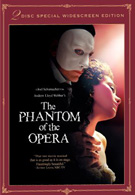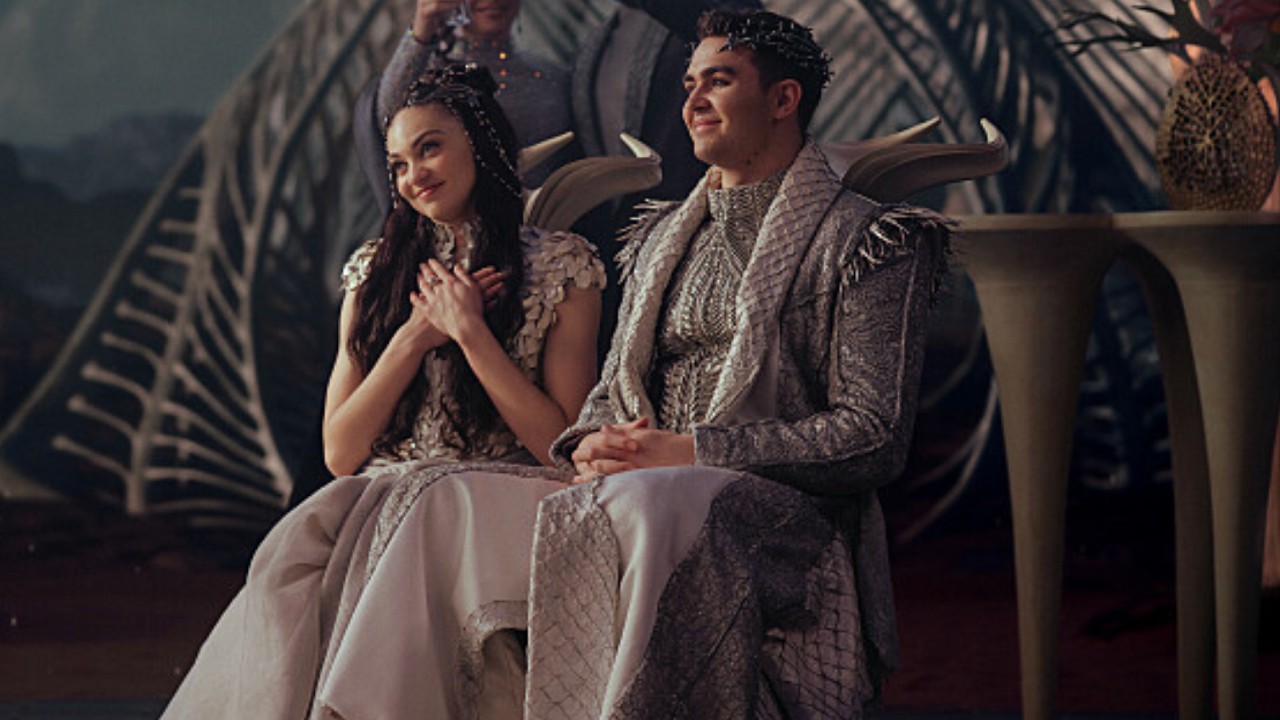“Lot 666 then….a chandelier in pieces. Some of you may recall the strange affair of the Phantom of the Opera, a mystery never fully explained…”
For years those words have opened the story for one of Broadway’s most popular and successful shows. Now they open one of the most elaborate and gloriously staged movies to grace the screen. Yet, for all its beauty there’s something lacking in this film adaptation of Andrew Lloyd Webber’s The Phantom of the Opera. Some magic element is needed to successfully bring a show designed for the opera house into the movie house. Phantom just doesn’t quite have it. It started as a true story, almost legend. It then became a novel by Gaston Leroux, a treacherous journey of love and intrigue through the underworld of the famed Paris Opera House. Somewhere along the way Andrew Lloyd Webber set it to some of the most beautiful music composed this century and created a theatrical masterpiece. Then, for reasons defying logic, someone handed it to Joel Schumacher and said “Make a movie”. Fate smiled. It wasn’t a total disaster.
The story of the Phantom of the Opera (whose name is Eric, though that fact never surfaces in either the musical or the film) is about a man who wants nothing more than to know and understand love. Despite being an artistic and architectural genius, an obscene physical deformity received at birth has kept him at arms length from the world. His only true joys in life are haunting the members of the Opera Populaire and giving secret voice lessons to a young orphaned chorus girl named Christine. She believes him to be an angel sent by her father from heaven to guard her. He is in love with the girl, but his is a misunderstood and jealous love.
When a childhood friend of Christine, the dashing Raoul Viscount de Chagney, arrives at the opera house as the new patron and financier, a gruesomely dark and dangerous love triangle forms. The Phantom plays every ingenious card in his hand to win Christine’s love, even if it means killing anyone who happens to be in the way. Hell hath no fury like a Phantom scorned.
The story sticks close to the one laid out in Webber’s musical. Schumacher, who has a co-writer credit with Webber on the screenplay, has expounded a little, creating a history for the Phantom that gives quick and dirty answers to questions that deserve a better explanation…or better yet, might have been left unanswered. To his credit, he slips in some clever moments from the book (like a deadly chamber of mirrors) that are quick delights. Mostly though, he just shovels exposition into the small gaps like a child with a plastic shovel and gets back to the good stuff: the music.
No matter how you slice it, the songs and choreography are the heart of this movie. And why not? They’re what made the stage production an instant classic. Much of that has translated beautifully from the stage with very little interference. While the musical storytelling absolutely glows on the screen it still lacks a level of reality that would have truly made it shine. There are points when it is clear the actors aren’t giving their best, as though they know a better version of the singing is going to be dubbed in later. The sincerity that comes from acting while singing live is missing during some of Phantom’s more tender moments. At times I felt like I was watching teenagers lip syncing their way through a high school play.
The movie has two bright sport that make it worth the watch. The first is ingénue (that’s an opera term kids, look it up) Emmy Rossum who is a vision as Christine. Her youthful appearance is belied by a rich, fresh voice and what is easily the strongest performance from the cast. The other gem in Phantom’s mask is its collection of magnificent sets and costumes. I could have spent an entire day just looking at footage of the details poured into every set and stitch.
Your Daily Blend of Entertainment News
Rossum is pure Broadway-to-screen gold, but to stop there would deny the rest of the cast the praise they deserve. The pleasantly funny thing about the performers is that the smaller their role, the more character they seem to have. A supporting cast of hundreds makes up the working stiffs of the Opera House, but their colorfulness and zest truly bring the movie to life. Minnie Driver deserves particular recognition for her completely appropriate over-the-top performance as La Carlotta. No, that’s not really her singing, but you wouldn’t know it until you saw the credits.
The only exception to my praise of the cast lies with the man behind the mask himself, Gerard Butler. Schumacher proves he hasn’t lost his touch for appalling choices when it comes to casting his leading men. After all, this is the director who brought us George Clooney as Batman. While Butler may have manly enough features to grace the cover of a Fabio romance novel, he fails every acid test for a singing performer. Gerard’s voice sounds like he’s struggling for every note and his acting suggests what we might get were Jim Carrey cast as Hamlet. His work in other movies has proven he’s not a terrible actor, but he is no Phantom.
Someone really rolled the dice when selecting Joel Schumacher as the director for The Phantom of the Opera, but for the most part the gamble paid off. I hope this doesn’t become a trend. Broadway shows, in my humble opinion, were written for the stage and should remain there. There is no movie that can capture the experience of seeing a live play. That said, this movie is still a noble attempt and successful enough to be well worth seeing. French speakers everywhere rejoice! The Phantom of the Opera DVD has an audio track just for you. Not only that, it is apparently such an important bonus that nothing else has been included, at least on the disc you’re likely to end up being able to get a copy of. Seriously, apart from the original theatrical trailer, the French audio track is the only feature on the regular release disc. Somebody should be ashamed. No, somebody should be fired. You have two choices when it comes to getting this movie on DVD: the regular or the two disc deluxe edition. People who opt for the regular disc get the short end of the stick with only the French audio to amuse you. Those willing to spend the extra money (and who can actually find a copy) can look forward to the second disc with all the real bonus features. LET THE BUYER BEWARE! There’s little to warn you that you’re not getting the full package you’re expecting when you pick up your copy. Be sure to get the one that says “”Two Disc Special Edition”. Don’t go off release dates. For whatever reason both versions were released at the same time.
Now that I have that little rant out of the way, let me start off with the first disc, the one you get in either package. In reviewing the features on DVDs I usually don’t listen to the foreign language dubs. I don’t speak that many foreign languages fluently so I couldn’t really comment on the quality of the translations. In this case, it was the only extra feature of note, so I indulged. I watched The Phantom of the Opera in French. I was blown away.
First off, there’s something very appropriate about hearing French spoken in a Paris opera house. I found the lips not matching up to the words to be a trifle annoying, but once you get past that it’s pleasant to listen to. I’ve listened to my CDs of the original London Cast recording of “Phantom of the Opera” enough times that I could sing the entire thing from memory. Oddly enough, that background wasn’t necessary. Though the lyrics were foreign, the music is written with a universal clarity and I didn’t miss a single emotion or thought.
The embarrassing part was that the French voice dub for the Phantom was an infinitely better singer than his English counterpart. In fact, I would encourage everyone who watches this disc to find their favorite solo by the Phantom and then switch over the to French track just so you can hear what the character should really sound like.
The second disc has all of the real goodies on it. Don’t look for any commentaries. There are none. There could have been, but there aren’t. Maybe Joel Schumacher is too good to talk to movie watchers. There are four featurettes of sorts to look at. The first is called Behind the Mask: The Story of the Phantom. It goes back into the history of the original stage production and how it came to be. It’s a long haul of a ride as it goes on for over an hour. Only true Webber fans need apply.
The other three are interesting enough to watch, but not nearly comprehensive enough for my tastes. Each of the three runs around twenty minutes and focuses on different areas of the production: casting and getting ready to take the movie from stage to screen, a little bit on the technical effects, and finally completing the film and its soundtrack. They’re worth a view, but only if you’re truly interested. There are no must sees here unless you really love watching movie makers and actors patting each other on the back. A deleted scene rounds out the package. I’m not sure why it was cut. Maybe so they could pad the list of DVD bonus features. For those bored enough to look there is a cast and crew sing-a-long easter egg. Don’t bother.
The most important thing about this release to beware of is its slightly deceitful nature. Be sure you know that if you get the regular version you’re not getting squat. Fork out the extra couple of bucks and get the special edition. Otherwise you might as well save your money, rent it, and spend what you save on a copy of the soundtrack instead.

